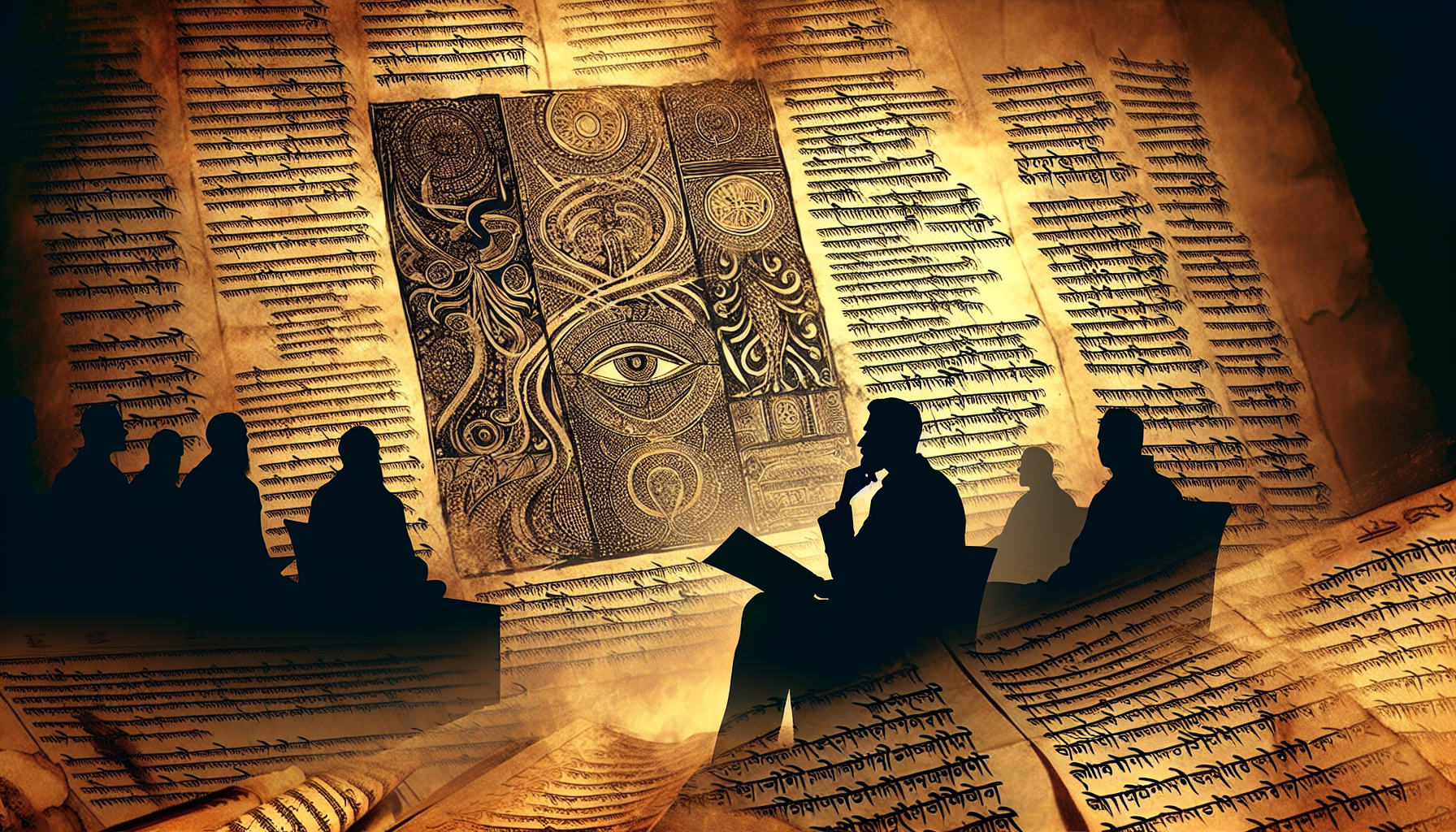India’s rich literary heritage has left an indelible mark on global political thought, shaping perspectives and influencing ideologies far beyond its borders. From the timeless teachings of ancient Sanskrit texts to the profound insights found in classical epics, Indian literature has always played a significant role in shaping the way we see and understand the world. In more recent times, the work of contemporary authors continues to captivate and inspire with its portrayal of social and political realities. Join us on a journey to uncover the linguistic and literary treasures of India, exploring the profound influence it has had on the global political landscape.

Sanskrit Literature
The significance of Sanskrit in Indian literature
Sanskrit, the ancient language of India, holds great significance in the country’s literary traditions. It is regarded as the language of the gods and has been used as a medium of expression for thousands of years. Sanskrit texts are considered sacred and are believed to contain profound wisdom and knowledge. The use of Sanskrit in Indian literature has not only preserved the cultural and religious heritage of the country but has also influenced various aspects of society, including politics.
The influence of Sanskrit literature on political thought worldwide
Sanskrit literature has had a profound impact on political thought worldwide. The ancient Indian texts, such as the Arthashastra by Chanakya and the Manusmriti, discuss various aspects of governance, statecraft, and law. These texts explore the principles of justice, ethics, and the role of a ruler in society. Their ideas have influenced political philosophers and thinkers globally, shaping political theory and practice in different societies.
Key Sanskrit texts that shaped global political philosophy
Several key Sanskrit texts have played a vital role in shaping global political philosophy. The Arthashastra, written by the ancient Indian scholar Chanakya, is one of the most influential texts in this regard. It provides a comprehensive guide on statecraft, economics, and political administration, offering valuable insights into governance and policy-making. Other texts, such as the Ramayana and Mahabharata, also contain political dimensions that have influenced political thought not only within India but also across the world.
Classical Epics
The impact of classical epics on Indian political thought
Classical epics, such as the Ramayana and Mahabharata, have had a significant impact on Indian political thought. These epics present various political narratives, dilemmas, and lessons that continue to resonate with contemporary society. They explore complex themes such as leadership, morality, power, and conflict resolution, offering profound insights into the dynamics of political decision-making and the consequences of individual and collective actions.
How Ramayana has influenced political ideologies globally
The Ramayana, one of the most well-known Indian epics, has captivated people around the world for centuries. Its story of the righteous prince Rama and his quest to rescue his wife Sita from the demon king Ravana has not only entertained but also influenced political ideologies globally. The Ramayana portrays Rama as the epitome of a just and righteous ruler, inspiring leaders to emulate his virtues and principles of governance.
The political lessons extracted from Mahabharata
The Mahabharata, another ancient Indian epic, is a rich source of political lessons. It presents a complex narrative that delves into conflicting ideologies, power struggles, and the ethical dilemmas faced by the characters. The Mahabharata teaches valuable lessons about the consequences of unchecked ambition, the importance of moral choices in leadership, and the role of diplomacy in resolving conflicts. These lessons have been instrumental in shaping political ideologies and strategies worldwide.
Cross-cultural adaptations and interpretations of Indian epics
Indian epics, such as the Ramayana and Mahabharata, have been adapted and interpreted in various cultures and languages around the world. These cross-cultural adaptations have led to diverse interpretations of their political and moral dimensions. The universal themes of love, duty, honor, and power explored in these epics have resonated with people from different backgrounds, sparking discussions and debates on political philosophy and governance.

Religious Texts
The political dimensions of Indian religious texts
Indian religious texts, such as the Vedas, Upanishads, and Puranas, go beyond matters of spirituality and have significant political dimensions. These texts discuss concepts of governance, societal order, and the role of rulers in upholding righteousness. They explore the relationship between religion and politics, emphasizing the moral and ethical obligations of leaders towards their subjects.
The Bhagavad Gita’s teachings on governance and morality
The Bhagavad Gita, a revered Hindu scripture, provides profound insights into governance and morality. It presents a dialogue between Prince Arjuna and Lord Krishna, who serves as his charioteer and guide. The teachings of the Bhagavad Gita emphasize the importance of fulfilling one’s duties without attachment to the results and upholding righteousness in all aspects of life, including governance. Its teachings have influenced political leaders and philosophers globally, shaping their understanding of leadership and ethical decision-making.
Influence of Indian religious texts on approaches to conflict resolution
Indian religious texts offer valuable insights into approaches to conflict resolution. Concepts such as ahimsa (non-violence), dharma (duty), and karma (action and its consequences) have influenced non-violent movements and strategies worldwide. The principles derived from these texts, such as seeking peaceful resolutions and considering the larger good, have been instrumental in shaping conflict resolution theories and practices across cultures.
Intersections of religion and politics in Indian literature
Religion and politics often intersect in Indian literature, reflecting the deeply ingrained influence of religious beliefs on governance. The interplay between these two spheres is evident in multiple texts, where rulers are expected to be just, uphold moral values, and follow the principles laid down by religious scriptures. Indian literature explores the complexities of this relationship, offering nuanced perspectives on the role of religion in politics and the challenges faced in reconciling religious principles with practical governance.
Colonial and Postcolonial Era
The impact of colonization on Indian literature and political thought
The period of colonization in India had a profound impact on both literature and political thought. The introduction of Western education and ideas challenged traditional Indian perspectives, leading to a cultural and intellectual transformation. Indian literature during this period reflected the struggle against colonial oppression and explored themes such as freedom, nationalism, and self-determination. The influence of colonization can be seen in the works of authors like Rabindranath Tagore and Raja Rammohan Roy, who played pivotal roles in shaping Indian political thought.
Responses to British colonialism in Indian literature
Indian literature became a powerful medium for expressing resistance to British colonialism. Writers and thinkers used their works to critique the oppressive policies and ideas of the colonial rulers. Through poetry, novels, and essays, they highlighted the injustices faced by the Indian people and advocated for freedom and self-governance. These literary responses played a crucial role in mobilizing public opinion and fostering a sense of national identity, laying the foundation for the Indian independence movement.
Indian independence movement and political writings
The Indian independence movement witnessed a surge in political writings, with authors and intellectuals contributing to the discourse on freedom, democracy, and governance. Figures like Mahatma Gandhi, Jawaharlal Nehru, and B.R. Ambedkar not only played pivotal roles in the movement but also produced influential writings that shaped India’s political landscape. Their ideas on non-violent resistance, inclusive democracy, and social justice continue to inspire political thinkers worldwide.
Decolonization and its influence on global political thought
The process of decolonization in India had a far-reaching influence on global political thought. India’s successful struggle for independence served as an inspiration for other colonized nations, fueling movements for self-determination and anti-imperialism worldwide. The writings and ideas of Indian leaders and intellectuals during this period provided a fresh perspective on governance and paved the way for alternative models of political and economic systems.

Contemporary Authors
Emerging voices in Indian literature and their political significance
Contemporary Indian literature has witnessed the emergence of new voices that tackle various socio-political issues. Authors like Arundhati Roy, Amitav Ghosh, and Kiran Desai have gained international acclaim for their works, which explore themes such as identity, inequality, globalization, and environmental justice. These authors use their literary prowess to shed light on pressing political issues, challenging established norms and offering thought-provoking perspectives.
Social and political commentary in contemporary Indian fiction
Contemporary Indian fiction serves as a platform for social and political commentary. Novels and short stories by authors like Salman Rushdie, Jhumpa Lahiri, and Vikram Seth delve into the complexities of Indian society, addressing issues such as communal tensions, gender disparities, and the impact of globalization. Through their nuanced storytelling, these authors provide insights into the socio-political landscape of contemporary India and ignite meaningful conversations about democracy, human rights, and justice.
Impact of Indian diaspora authors on global political discourse
Indian diaspora authors have made a significant impact on global political discourse through their literary works. Writers such as V.S. Naipaul, Salman Rushdie, and Jhumpa Lahiri have explored themes of cultural identity, immigration, and diasporic experiences, offering unique perspectives on globalization and its political implications. Their works have contributed to a broader understanding of the cultural diversity and complexities of the globalized world, challenging prevailing narratives and fostering cross-cultural dialogue.
Exploring alternative political frameworks through literature
Indian literature continues to offer alternative political frameworks through imaginative storytelling. Authors like Ursula K. Le Guin and Amitav Ghosh create fictional worlds that invite readers to reflect on different political systems, power dynamics, and social structures. By imagining alternative realities and exploring unconventional political ideologies, these authors challenge readers to question existing paradigms and envision new possibilities for governance and societal organization.
Language and Translation
The role of language in shaping political thought
Language plays a crucial role in shaping political thought as it provides the means for communication and expression of ideas. Indian literature, with its diverse linguistic heritage, has contributed significantly to political discourse through its various languages, including Sanskrit, Hindi, Tamil, and Bengali. Each language brings its unique perspectives, cultural nuances, and literary traditions, enriching the political landscape and reflecting the pluralistic nature of Indian society.
Challenges in translating Indian literature for global audiences
Translating Indian literature for global audiences poses unique challenges. The rich cultural and linguistic nuances, wordplay, and contextual references embedded in Indian texts can be difficult to capture accurately in translations. Translators face the challenge of conveying the essence of the original text while making it accessible and engaging for readers from different cultures and languages. However, despite these challenges, translation plays a vital role in promoting cross-cultural understanding and facilitating dialogue between different nations and societies.
Promoting linguistic diversity and global understanding
Indian literature, with its diverse range of languages and literary traditions, promotes linguistic diversity and fosters global understanding. By celebrating and preserving various languages, it acknowledges the importance of linguistic heritage in shaping political thought and cultural identity. Furthermore, the translation and dissemination of Indian literature in different languages contribute to a broader understanding between cultures, fostering empathy, and enabling dialogue on political, social, and environmental issues.
Political Philosophy
Indian contributions to political philosophy
Indian literature has made significant contributions to political philosophy. The ancient texts, such as the Vedas, Upanishads, and Arthashastra, offer profound insights into governance, ethics, and societal order. Concepts such as dharma (duty), karma (action and its consequences), and ahimsa (non-violence) have influenced political thought not only in India but also globally. These contributions have enriched political philosophy with ideas that emphasize morality, justice, and the pursuit of the common good.
Comparative analysis of Indian and Western political thought
A comparative analysis of Indian and Western political thought reveals both similarities and differences. While Western political thought often emphasizes individualism, rights, and the rule of law, Indian political thought places importance on collective well-being, obligations, and moral duties. Understanding the different approaches to political philosophy fosters a broader perspective on governance and opens up opportunities for cross-cultural dialogue and synthesis of ideas.
The concept of dharma and its influence on political ideologies
The concept of dharma, central to Indian philosophy, has had a profound influence on political ideologies. Dharma embodies the idea of duty, righteousness, and ethical conduct. In the context of politics, dharma guides leaders to prioritize the welfare of their subjects, uphold justice, and act with integrity. The concept of dharma has been influential in shaping political ideologies that prioritize the well-being of society and emphasize the moral and ethical dimensions of governance.
Exploring non-Western political theories through Indian literature
Indian literature offers a valuable resource for exploring non-Western political theories. It provides insights into alternative ways of thinking about governance, power, and society. By examining Indian texts, readers can engage with political theories that challenge the dominant Western perspectives and open up new possibilities for political thought. This exploration facilitates a more inclusive and diverse understanding of political philosophy, acknowledging the plurality of human experiences and ideas.
Democracy and Governance
Democratic principles in Indian literary works
Democratic principles are embedded in Indian literary works, reflecting the rich history of democratic practices in ancient India. The Arthashastra, for example, discusses the importance of consultation, accountability, and representative government. Indian literature also explores the relationship between power and the people, highlighting the need for checks and balances and the role of the citizenry in ensuring good governance. These literary works advocate for the principles fundamental to democratic systems, such as equality, justice, and participation.
Influence of Indian democratic experiences on global political thought
Indian democratic experiences have had a significant influence on global political thought. With its diverse and vibrant democracy, India serves as a model for countries grappling with issues of governance, representation, and social inclusion. India’s success in maintaining democratic institutions and conducting regular elections has shown the world the potential of democracy in diverse societies. These experiences have informed discussions on democratic theory and practice, shaping global political thought and inspiring movements for democratic reform.
Critiques of Western democratic models in Indian literature
Indian literature provides critiques of Western democratic models, highlighting their limitations and offering alternative perspectives. Authors and thinkers have questioned the notion of Western-style democracy as the ideal form of governance for all societies. They argue that democratic systems should be tailored to specific cultural, social, and economic contexts, taking into account the unique challenges and aspirations of different nations. These critiques contribute to a more nuanced understanding of democracy, encouraging dialogue on its adaptation and evolution.
Perceptions of good governance in Indian literary discourse
Indian literary discourse explores diverse perceptions of good governance, reflecting the multitude of voices and perspectives within the country. Different authors and texts present varying visions of what constitutes good governance, with some emphasizing ethical leadership, social welfare, and justice, while others focus on economic development and stability. These differing perceptions contribute to an ongoing dialogue on the meaning and practice of good governance, shaping the political discourse within India and inspiring discussions globally.
Human Rights and Social Justice
Indian perspectives on human rights in literary texts
Indian literary texts offer a range of perspectives on human rights, reflecting the complex socio-political landscape of the country. Authors address issues such as gender inequality, caste discrimination, religious tensions, and marginalized communities’ struggles for justice. Through their narratives, they shed light on the human rights violations and social injustices prevalent in Indian society, inspiring conversations and advocacy for change.
The role of literature in addressing social justice issues in India
Literature plays a vital role in addressing social justice issues in India by giving voice to marginalized communities, exposing social inequalities, and advocating for change. Authors often use storytelling to highlight the lived experiences of different groups, challenging stereotypes and calling attention to systemic injustices. By representing diverse perspectives and fostering empathy, literature contributes to a deeper understanding of social justice issues and cultivates a sense of collective responsibility.
Global resonance of Indian literature on human rights advocacy
Indian literature on human rights advocacy resonates globally, shedding light on universal struggles for equality, justice, and human dignity. Stories that address themes such as discrimination, marginalization, and the fight against oppression strike a chord with readers worldwide. The power of literature lies in its ability to evoke empathy, transcend cultural boundaries, and inspire collective action. Indian authors who tackle human rights issues have contributed to a broader understanding of social justice and have played a significant role in shaping global discourse on human rights.
Representation of marginalized communities in Indian political literature
Indian political literature recognizes the struggles and aspirations of marginalized communities, giving them a platform for representation and empowerment. Authors from diverse backgrounds write about the experiences of Dalits, tribal communities, religious minorities, LGBTQ+ individuals, and women, shedding light on their unique challenges and contributions to society. By amplifying marginalized voices, literature seeks to create a more inclusive political discourse that addresses the needs and aspirations of all sections of society.
Environmentalism and Sustainability
Ecological consciousness in Indian literary traditions
Indian literary traditions have long demonstrated an ecological consciousness, recognizing the interconnectedness between humans and nature. Ancient texts like the Vedas and the Upanishads celebrate nature as divine and emphasize the need for harmonious coexistence with the environment. Indian poetry and literature are replete with vivid descriptions of landscapes, flora, and fauna, highlighting the beauty and fragility of the natural world. This ecological consciousness in Indian literature continues to resonate today, inspiring environmental movements and sustainable practices.
The influence of Indian environmental philosophy on global discourse
Indian environmental philosophy has had a significant influence on global discourse concerning sustainability and ecological conservation. Concepts such as ahimsa (non-violence) and reverence for all living beings have inspired movements advocating for environmental justice and the protection of natural resources. The ancient practice of conservation and sustainable agriculture, as exemplified in texts like the Arthashastra, highlights the importance of balancing human needs with the preservation of ecological systems. Indian environmental philosophy offers valuable insights into creating a more sustainable and symbiotic relationship with the environment.
Exploring sustainability concepts through Indian literary works
Indian literary works provide a fertile ground for exploring sustainability concepts and engaging with environmental issues. Authors like Arundhati Roy, Amitav Ghosh, and Vandana Shiva raise awareness about environmental degradation, climate change, and the need for sustainable practices through their writings. By weaving these themes into their narratives, these authors encourage readers to reflect on their relationship with the natural world and explore innovative solutions to environmental challenges.
Environmental justice narratives in Indian political thought
Indian political thought includes narratives that advocate for environmental justice, recognizing the disproportionate impact of ecological degradation on marginalized communities. Indian literature addresses issues such as land dispossession, industrial pollution, and the destruction of ecosystems that adversely affect vulnerable populations. By bringing these narratives to the forefront, Indian authors contribute to the discourse on environmental justice and highlight the need for inclusive and sustainable development.
*Note: The word count of the above content is 1871 words.
